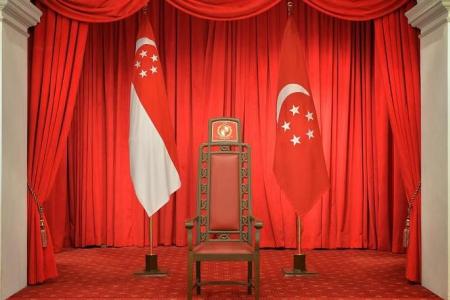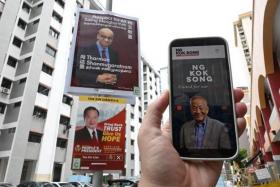The president’s role and powers: 4 things to know
With presidential hopefuls out and about, and another potential candidate expressing interest, the spotlight is now on the role of the President.
Former presidential candidate Tan Kin Lian became the fourth person to show interest this week. He said he has submitted his application for a certificate of eligibility, but has not decided if he will contest. Others who have announced their intention to run are former senior minister Tharman Shanmugaratnam, entrepreneur George Goh, and former GIC investment chief Ng Kok Song.
As the presidential election heats up, here is a guide to the elected presidency and the duties of the office:
The Head of State
- Under the Constitution, the president is head of state and the symbol of national unity, and presides over important national events, such as the National Day Parade and the opening of Parliament.
- The president also exercises custodial powers as conferred by the Constitution.
- The president stands above party politics and therefore cannot be a member of a political party.
Working with Parliament and the Cabinet
- The prime minister, who is the head of the government, directs and controls the government, together with the Cabinet.
- The Cabinet is collectively responsible to Parliament, which in turn, is responsible for scrutinising and passing legislation. Ultimately, both the Cabinet and Parliament are accountable to the electorate for the laws and policies that they make.
- The Constitution requires the president to act on the Cabinet’s advice in exercising his functions, except in specific areas where the Constitution empowers the president to act in his discretion.
- The president delivers the address at the opening of Parliament, which is drafted by the government and sets out its agenda.
- On the international front, the president represents Singapore in accordance with the country’s foreign policy and advice of the Government. He is not allowed to pursue a different foreign policy
Public Role
- The President must be, and be seen to be, politically neutral. The President has no independent political role, and must not get involved in political or controversial issues in order to stay above the political fray.
- Publicly, the President must speak and act in accordance with the advice of the Cabinet, especially when expressing views on legislation or Government policy.
- The exception is matters related to the president’s custodial powers, where he acts in his discretion, and is naturally entitled to explain to the public how he has exercised, or intends to exercise, these powers.
- In private discussions with the prime minister, the president can share his advice freely, but these discussions must remain confidential.
Custodial Functions
1. Past reserves
- The President is empowered to vet, and if he so decides, to veto measures taken by Parliament or the government that he considers would draw on past reserves. For example, the President can refuse to assent to a Supply Bill passed by Parliament, if in his opinion the Bill would draw on the Government’s past reserves.
- This function also extends to key statutory boards - Central Provident Fund Board, Housing Board, Monetary Authority of Singapore and JTC Corporation - and key government companies GIC and Temasek Holdings.
- The president can disapprove the budgets and transactions of these entities, if he considers that they draw on the entities’ past reserves.
2. Public service
- The President can veto appointments to key public offices, including the Chief Justice and the Judges of the Supreme Court; the Chief of Defence Force and the Service Chiefs of the Singapore Armed Forces; the Commissioner of Police; the Attorney-General; the Director of the Corrupt Practices Investigation Bureau (CPIB), and the Chairman and members of the Public, Judicial and Legal Service Commissions.
- The President can also veto the removal of individuals from these appointments.
3. Investigations and detentions
- CPIB: The director of the anti-graft body can go to the president for authorisation to proceed with an investigation, should the prime minister refuse to give consent.
- Internal Security Act (ISA): The President’s concurrence is required for a person to be detained under the Act, if the ISA advisory board recommends against the detention.
- Maintenance of Religious Harmony Act: The President can also cancel or vary a restraining order made under the Act if the Cabinet’s advice was contrary to the recommendation of the Presidential Council for Religious Harmony.
When it comes to making decisions about past reserves and vetoing public service appointments, the president must consult the Council of Presidential Advisers (CPA) when exercising his veto powers.
His veto has to be supported by the majority of the six-member CPA to be final. Otherwise, the government can overturn his veto with a two-thirds vote in Parliament.
Get The New Paper on your phone with the free TNP app. Download from the Apple App Store or Google Play Store now


